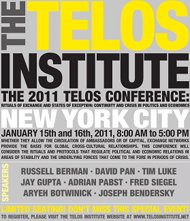This text was presented at the 2011 Telos Conference, “Rituals of Exchange and States of Exception: Continuity and Crisis in Politics and Economics.”
Of Power and Princes
 During the sixteenth century, in his famous work The Prince, Machiavelli was already writing about the possibility of a hegemonic and civic form of political power. He described it as a type of principality where consensus was more important than brute force: “we now come to the case where a citizen becomes a prince not through crime or intolerable violence, but by the favour of his fellow-citizens, which may be called a civic principality.”[1] This text was one source of inspiration for the twentieth-century communist thinker Antonio Gramsci, who wrote about the possibility of creating a “Modern Prince.” This “Modern Prince” would take the form of a renewed and hegemonic communist party capable of waging a war of position against bourgeois hegemony.
During the sixteenth century, in his famous work The Prince, Machiavelli was already writing about the possibility of a hegemonic and civic form of political power. He described it as a type of principality where consensus was more important than brute force: “we now come to the case where a citizen becomes a prince not through crime or intolerable violence, but by the favour of his fellow-citizens, which may be called a civic principality.”[1] This text was one source of inspiration for the twentieth-century communist thinker Antonio Gramsci, who wrote about the possibility of creating a “Modern Prince.” This “Modern Prince” would take the form of a renewed and hegemonic communist party capable of waging a war of position against bourgeois hegemony.







